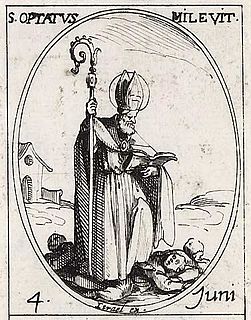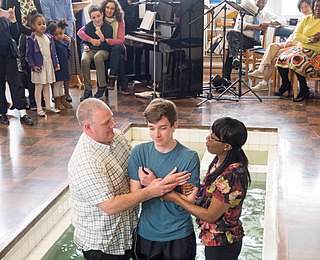
Eusebius of Caesarea, also known as Eusebius Pamphili, was a historian of Christianity, exegete, and Christian polemicist. He became the bishop of Caesarea Maritima about AD 314. Together with Pamphilus, he was a scholar of the Biblical canon and is regarded as one of the most learned Christians of his time. He wrote Demonstrations of the Gospel, Preparations for the Gospel and On Discrepancies between the Gospels, studies of the Biblical text. As "Father of Church History", he produced the Ecclesiastical History, On the Life of Pamphilus, the Chronicle and On the Martyrs. He also produced a biographical work on Constantine the Great, the first Christian Emperor, who was augustus between AD 306 and AD 337.

The First Council of Nicaea was a council of Christian bishops convened in the Bithynian city of Nicaea by the Roman Emperor Constantine I in AD 325.
Pope Miltiades, also known as Melchiades the African, was the bishop of Rome from 311 to his death on 10 or 11 January 314. It was during his pontificate that Emperor Constantine the Great issued the Edict of Milan (313), giving Christianity legal status within the Roman Empire. The pope also received the palace of Empress Fausta where the Lateran Palace, the papal seat and residence of the papal administration, would be built. At the Lateran Council, during the schism with the Church of Carthage, Miltiades condemned the rebaptism of apostatised bishops and priests, teaching of Donatus Magnus.

Donatism was a heresy leading to schism in the Church of Carthage from the fourth to the sixth centuries AD. Donatists argued that Christian clergy must be faultless for their ministry to be effective and their prayers and sacraments to be valid. Donatism had its roots in the long-established Christian community of the Roman Africa province in the persecutions of Christians under Diocletian. Named after the Berber Christian bishop Donatus Magnus, Donatism flourished during the fourth and fifth centuries.

Constantinian shift is used by some theologians and historians of antiquity to describe the political and theological aspects and outcomes of the 4th-century process of Constantine's integration of the imperial government with the Christian Church that began with the First Council of Nicaea. The term was popularized by the Mennonite theologian John H. Yoder.

Cirta, also known by various other names in antiquity, was the ancient Berber and Roman settlement which later became Constantine, Algeria. Cirta was the capital city of the Berber kingdom of Numidia; its strategically important port city was Russicada. Although Numidia was a key ally of the ancient Roman Republic during the Punic Wars, Cirta was subject to Roman invasions during the 2nd and 1st centuries BC. Eventually it fell under Roman dominion during the time of Julius Caesar. Cirta was then repopulated with Roman colonists by Caesar and Augustus and was surrounded by a "confederation of free Roman cities" such as Tiddis, Cuicul, and Milevum. The city was destroyed in the beginning of the 4th century and was rebuilt by the Roman emperor Constantine the Great, who gave his name to the newly constructed city, Constantine. The Vandals damaged Cirta, but emperor Justinian I reconquered and improved the Roman city. It declined in importance after the Muslim invasions, but a small community continued at the site for several centuries. Its ruins are now an archaeological site.
Saint Pamphilus, was a presbyter of Caesarea and chief among the biblical scholars of his generation. He was the friend and teacher of Eusebius of Caesarea, who recorded details of his career in a three-book Vita that has been lost.
The archiepiscopal see of Caesarea in Palaestina, also known as Caesarea Maritima, is now a metropolitan see of the Eastern Orthodox Patriarchate of Jerusalem and also a titular see of the Catholic Church. It was one of the earliest Christian bishoprics, and was a metropolitan see at the time of the First Council of Nicaea, but was later subjected to the Patriarchate of Jerusalem. The city remained largely Christian until the Crusades, its bishop maintaining close ties to the Byzantine Empire. After the establishment of the Kingdom of Jerusalem by the crusaders, the see was transformed into a Latin archdiocese, subordinate to the Latin patriarch of Jerusalem.

During the reign of the Roman Emperor Constantine the Great (AD 306–337), Christianity began to transition to the dominant religion of the Roman Empire. Historians remain uncertain about Constantine's reasons for favoring Christianity, and theologians and historians have often argued about which form of early Christianity he subscribed to. There is no consensus among scholars as to whether he adopted his mother Helena's Christianity in his youth, or, as claimed by Eusebius of Caesarea, encouraged her to convert to the faith he had adopted himself.

Saint Optatus, sometimes anglicized as St. Optate, was Bishop of Milevis, in Numidia, in the fourth century, remembered for his writings against Donatism.
The Pneumatomachi, also known as Macedonians or Semi-Arians in Constantinople and the Tropici in Alexandria, were an anti-Nicene Creed sect which flourished in the countries adjacent to the Hellespont during the latter half of the fourth, and the beginning of the fifth centuries. They denied the godhood of the Holy Ghost, hence the Greek name Pneumatomachi or 'Combators against the Spirit'.

The Church History of Eusebius, the bishop of Caesarea was a 4th-century pioneer work giving a chronological account of the development of Early Christianity from the 1st century to the 4th century. It was written in Koine Greek, and survives also in Latin, Syriac and Armenian manuscripts.

Believer's baptism is the Christian practise of baptism as is understood by many evangelical denominations, particularly those that descend from the Anabaptist and English Baptist tradition. According to their understanding, a person is baptized on the basis of his or her profession of faith in Jesus Christ and as admission into a local community of faith.

The Eastern Orthodox Church is opposed to the Roman Catholic doctrine of papal supremacy. While not denying that some form of primacy could exist for the Bishop of Rome, Orthodox Christians argue that the tradition of Rome's primacy in the early Church was not equivalent to the current doctrine of supremacy.
Heortasius was a 4th-century bishop of Sardis and attendee at the Councils of Seleucia and Constantinople. He was a proto-Catholic who was sent into exile by the Semi-Arian faction following their victory at the afore-mentioned Councils.

Majorinus was the leader of a schismatic Christian sect in Roman North Africa known as the Donatists.

Purpurius was a Donatist bishop from 305 to 320 AD, who was instrumental in establishing the Donatist movement of Roman North Africa.
Parmenian was a North African Donatist bishop, the successor of Donatus in the Donatist bishopric of Carthage. He wrote several works defending the rigorist views of the Donatists and is recognized as "the most famous Donatist writer of his day", but none of his writings have survived.

Petilianus was an eminent Donatist of the 5th century Roman North Africa, who is known to history through the letters he wrote to the Catholic Bishop Augustine of Hippo and discourses in Augustine's replies. Although most of what we know of him comes from Augustine, his main theology seems to have been "that the true church was only composed of those who were repentant."
The First Council of Cirta was a synod of bishops called by Secundus of Tigisis, the Primate of Numidia in AD 303 or 305.











